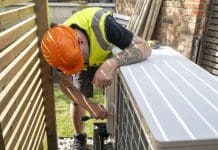New data from the Electrification of Heat Demonstration Project and Energy Efficiency at City Plumbing has shown that although heat pumps are three times more efficient than gas boilers, there is a serious skills gap, with only 18% of engineers knowing how to install them
Real-world monitoring has shown that air source heat pumps are three times more efficient than gas boilers, and can operate with high efficiencies, even in cold weather, according to new performance data released as part of the Electrification of Heat Demonstration Project.
The Electrification of Heat Demonstration Project is funded by the Department for Energy Security and Net Zero and is working to understand the technical and practical feasibility, and constraints of a mass rollout of ASHPs into British homes.
742 ASHPs were installed by delivery contractors as part of the project
When evaluating seasonal performance factor improvements, a median of 2.80 was observed during the EoH Demonstration Project, a significant increase of around 0.3 to 0.4 (30-40%) since the Renewable Heat Premium Payment scheme (RHPP) heat pump trial was undertaken between 2011-2014.
A leading factor in this improvement is likely due to innovation in the industry and in the heat pump systems themselves, according to the study.
Despite the good seasonal performance factor improvements, this suggests that progress is still required to improve the consistency of heat pump design and installation to support a large-scale rollout of heat pumps in existing homes and to deliver positive environmental and consumer outcomes.
Hybrid Heat Pump performance
The study showed that hybrid heat pumps were commissioned to run ‘cost-optimally’. Performance data reveals that heat pumps in hybrid systems typically met about 39% of the space heating demand, and had a median heat pump efficiency of 2.37, which is lower than standalone ASHPs.
‘Innovation is changing the game in the heating sector’
Marc Brown, business leader at Energy Systems Catapult, said: “The interim findings of the Electrification of Heat Demonstration Project highlight just how far the industry has come in innovating to improve the performance and efficiency of heat pumps.
“With the release of this data, we can finally put to bed the notion that heat pumps do not work in cold weather conditions and that they are inefficient to run. We’ve observed the exact opposite. They are three times more efficient than gas boilers and work in cold weather conditions. Innovation is changing the game in the heating sector.”
Innovation and training are critical to the success of a mass rollout of heat pumps
He continued: “While we’re taking steps in the right direction, we should not grow complacent. At the risk of sounding like a broken record, innovation and training are critical to the success of a mass rollout of heat pumps.
“We’ve done the hard work and demonstrated that heat pumps work – the UK is heat pump ready. Now we need to apply those learnings. Government and industry should commit to investing in upskilling existing installers in low carbon heating solutions and doing more to attract new talent into the sector.
“This should be coupled with public and private investment in innovation to help transform the sector and deliver on our Net Zero ambitions, without losing sight of the consumer. Get this right and we can be a world leader in green heating solutions.”
A new survey from Energy Efficiency at City Plumbing reveals that only 18% of engineers know how to install heat pumps
A new survey commissioned by Energy Efficiency at City Plumbing has illustrated a stark gap in heat pump skills and has revealed that only 18% of engineers are currently installing heat pumps and 44% don’t know where to go to get trained.
Results from the survey echo Marc Brown’s earlier statement about the importance of training in ensuring that heat pumps are delivered, and show there is significant work to provide installers with all the information they require about the topic, inspire them to seek training, and address their concerns.
Between 60,000 – 70,000 heat pumps were installed last year
Despite the government’s target of installing 600,000 heat pumps per year by 2028, figures show that last year only 60,000 and 70,000 were installed.
Other findings from the survey include:
- 44% of installers don’t know where to go to get trained and only 27% say it’s easy to find a course near where they live
- Just 18% of installers currently install heat pumps and only 6% are MCS certified
- 32% of installers are unaware of the government’s Boiler Upgrade Scheme in England and Wales (which offers discounts for homeowners switching to a heat pump if they use a certified installer)
- Only 45% of installers say they are confident they know enough about heat pumps to explain their benefits to customers.
The construction industry needs to ensure that training is made more accessible
Adam Foy, managing director of Energy Efficiency at City Plumbing, commented: “This is a significant issue for everyone if we want to achieve net zero targets and it is one that we should be talking about urgently.
“As an industry, we need to make training more accessible. We should be there for installers who are interested in upskilling and encouraging others that doing so will be good for their business.
“The underlying interest is there. Our survey also revealed that 49% of installers would consider becoming MCS certified if there was a course available locally. Moreover, when we asked installers if becoming certified would be good for their careers, 82% agreed.
“It’s not possible to achieve government targets without trained installers, so now is the time to act.”
Net zero targets will be hard to acheive without the correct number of trained installers
Adam added: “We need installers to be ambassadors for renewable technologies, especially in the domestic market where many homeowners are yet to be convinced, so education and effective communication is vital.
“Ultimately, Net Zero targets are going to be difficult to achieve without the right number of trained installers.”

















